Best Deck Finishes for Cold & Sunny Climates
Contents
Virginia’s extreme climate exposes how deck finishes truly perform. With humid summers topping 90°F and freezing winters, decks constantly expand, contract, and absorb moisture - testing every finish’s durability.
Choosing the right deck stain or sealer in Virginia isn’t just about looks; it’s what determines whether your deck lasts decades or fails in a few seasons. Transparent stains need reapplication every 1–2 years in the state’s humid subtropical conditions, while high-quality semi-transparent or oil-based finishes can extend protection to 3–4 years with proper maintenance.
Timing also matters - apply between 50°F and 90°F in spring or fall for maximum adhesion and weather resistance. From UV damage to heavy moisture, Virginia’s decks face challenges that demand climate-specific waterproof coatings engineered to resist heat, humidity, and cold. The right deck finish for Virginia’s climate protects your investment and dramatically lowers long-term maintenance costs.
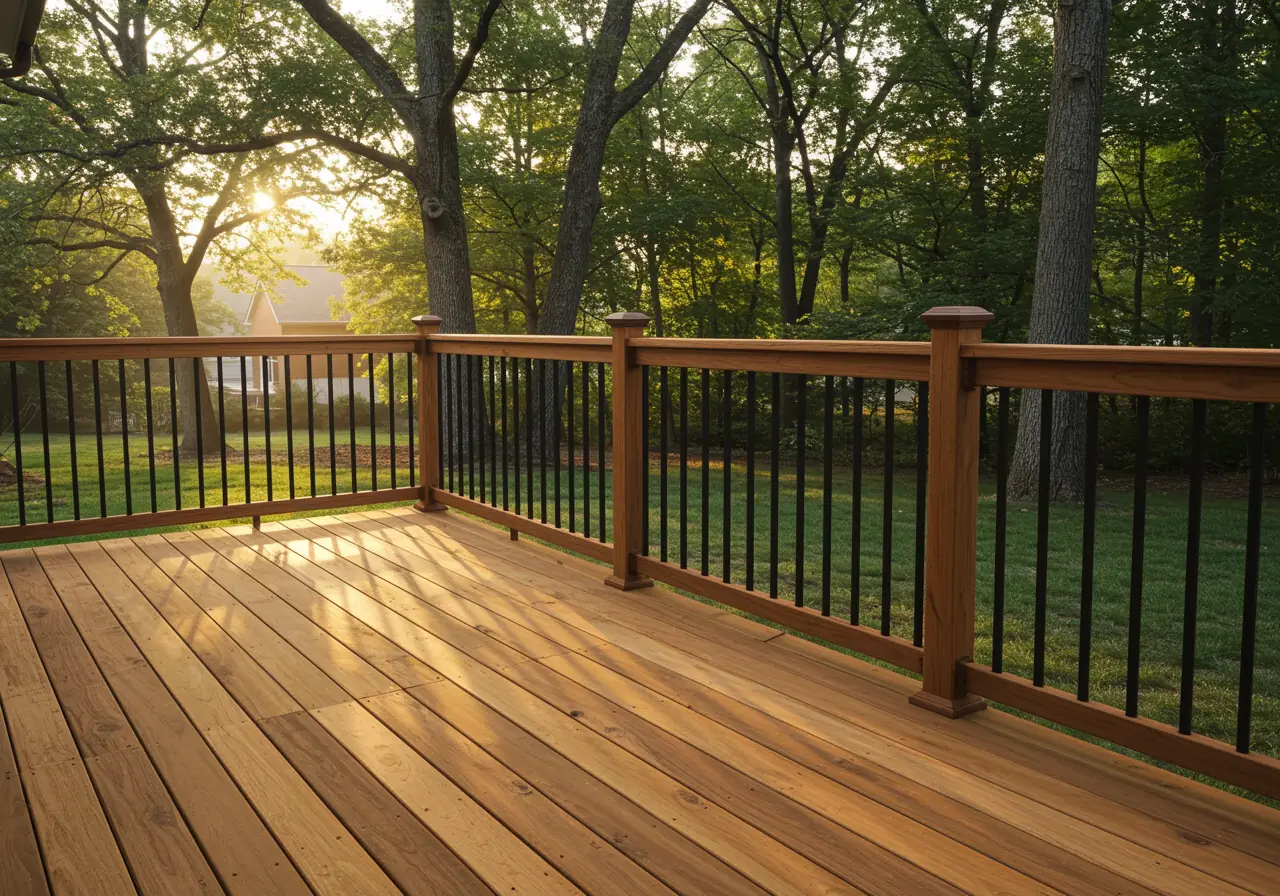
Understanding Virginia's Climate Challenges for Decks
Virginia's diverse geography creates distinct performance zones that dramatically affect deck finish longevity. From the Chesapeake Bay's salt-laden coastal humidity to the Blue Ridge Mountains' severe temperature swings, each region demands specific protection strategies that standard finishing approaches simply cannot address.
The climate data reveals why generic deck treatments fail consistently across Virginia's varied conditions. Understanding these regional weather patterns becomes essential for selecting finishes that actually perform rather than merely meeting initial appearance expectations.
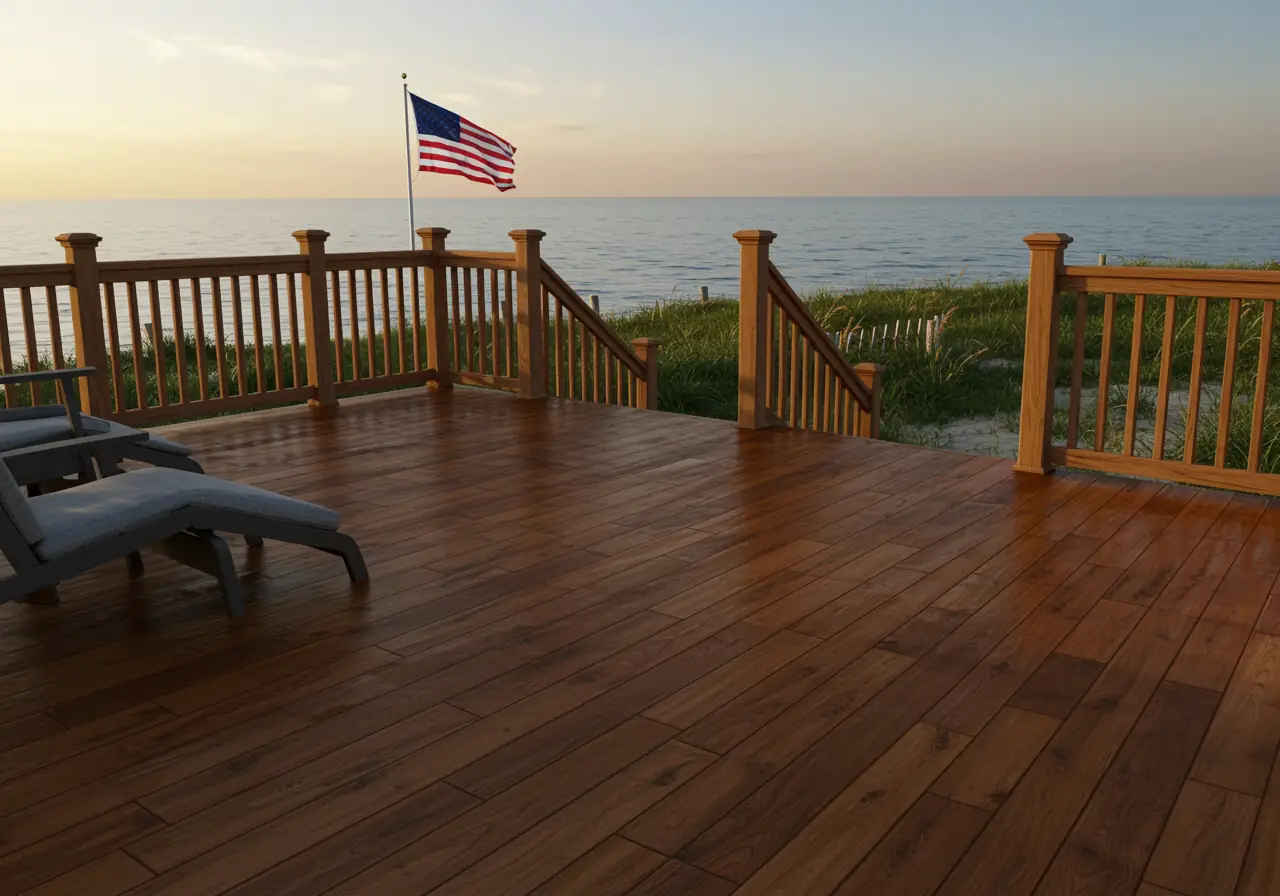
How cold winters and hot summers affect deck finishes
Temperature stress creates the primary failure mechanism for deck coatings across Virginia's climate zones. Winter freeze-thaw cycles force wood fibers to contract and expand repeatedly, generating microscopic fractures that compromise finish integrity. These hairline cracks become entry points for moisture infiltration - the beginning of premature coating failure.
Summer heat acceleration compounds this damage significantly. When temperatures frequently exceed 90°F, thermal breakdown occurs in finishes not engineered for high-temperature performance. The molecular structure of many standard coatings deteriorates under sustained heat exposure, losing adhesion and protective properties within months rather than years.
The damage pattern reveals why timing matters so critically for Virginia applications. Coatings applied outside optimal temperature windows never achieve proper molecular bonding with wood substrates. Poor initial adhesion amplifies the stress from seasonal temperature swings, creating a cycle of early coating failure that many homeowners mistake for normal wear patterns.
Weather data from Virginia's climate stations confirms why standard finishing schedules fail. The state experiences over 100 days annually with temperatures outside the ideal application range, creating narrow windows for successful coating installation. This limited timeframe forces many contractors to compromise on application conditions, directly impacting long-term performance and necessitating careful consideration of reapplication timing.

Humidity, UV exposure, and moisture retention
Virginia's humidity levels regularly exceed 70% during summer months, creating conditions where moisture-related deterioration accelerates rapidly. Approximately 2,600 hours of annual sunshine compound these challenges, with UV radiation intensifying during peak summer periods to create a destructive combination most finishes cannot withstand.
The environmental data reveals why standard deck finishes fail prematurely across Virginia:
- Humidity levels above 70% promote aggressive mold and mildew growth beneath poorly sealed surfaces
- UV radiation systematically breaks down wood lignin and finish resins, causing premature graying and structural deterioration
- Freeze-thaw cycles force accumulated moisture deeper into wood fibers, creating internal damage invisible during initial inspections
These demanding conditions expose the performance gap between standard and premium finishes. Most conventional products require reapplication every 1-2 years when subjected to Virginia's environmental stresses, though premium formulations designed for regional climate challenges can extend protection cycles to 3-4 years with appropriate maintenance protocols.
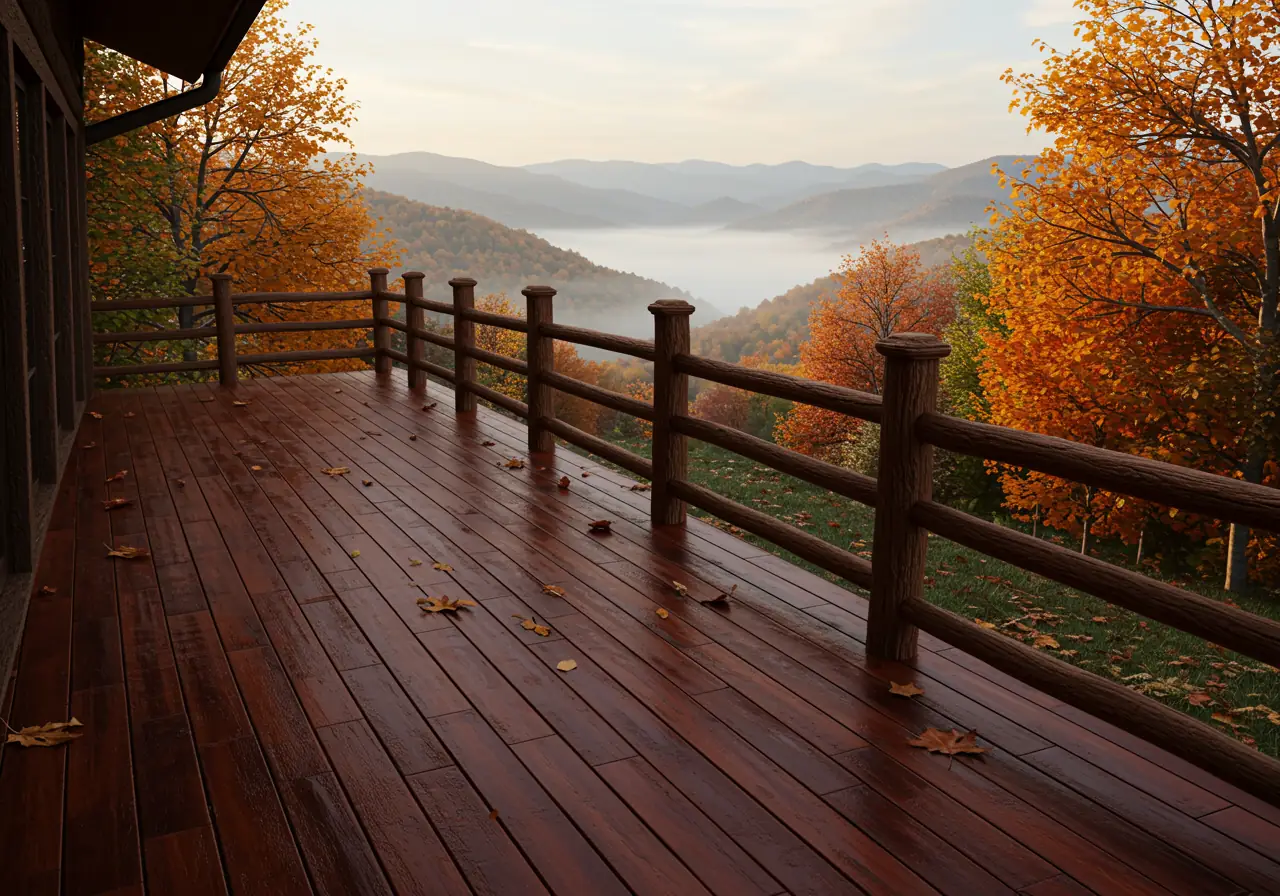
The moisture retention factor becomes particularly problematic for Virginia homeowners. Unlike drier climates where finishes can cure and breathe properly, Virginia's sustained humidity levels prevent complete moisture evacuation, leading to finish failure from within the wood structure itself. This underscores the importance of selecting finishes with superior waterproofing capabilities.
Why climate-specific finishes matter
Performance testing reveals substantial durability differences when finishes match Virginia's specific climate demands. Oil-based products penetrate deeper into wood fibers, creating superior moisture barriers against Virginia's humidity fluctuations that regularly exceed 70% during summer months. Water-based alternatives deliver enhanced UV protection and color retention - critical for withstanding Virginia's approximately 2,600 hours of annual sunshine.
Regional climate variations across Virginia demand targeted finish selection. Coastal properties face salt exposure and elevated humidity levels that require finishes with mildewcides to prevent fungal growth beneath surface coatings. Mountain regions experiencing heavier snowfall benefit from enhanced water repellency formulations that block moisture absorption during extended winter periods.
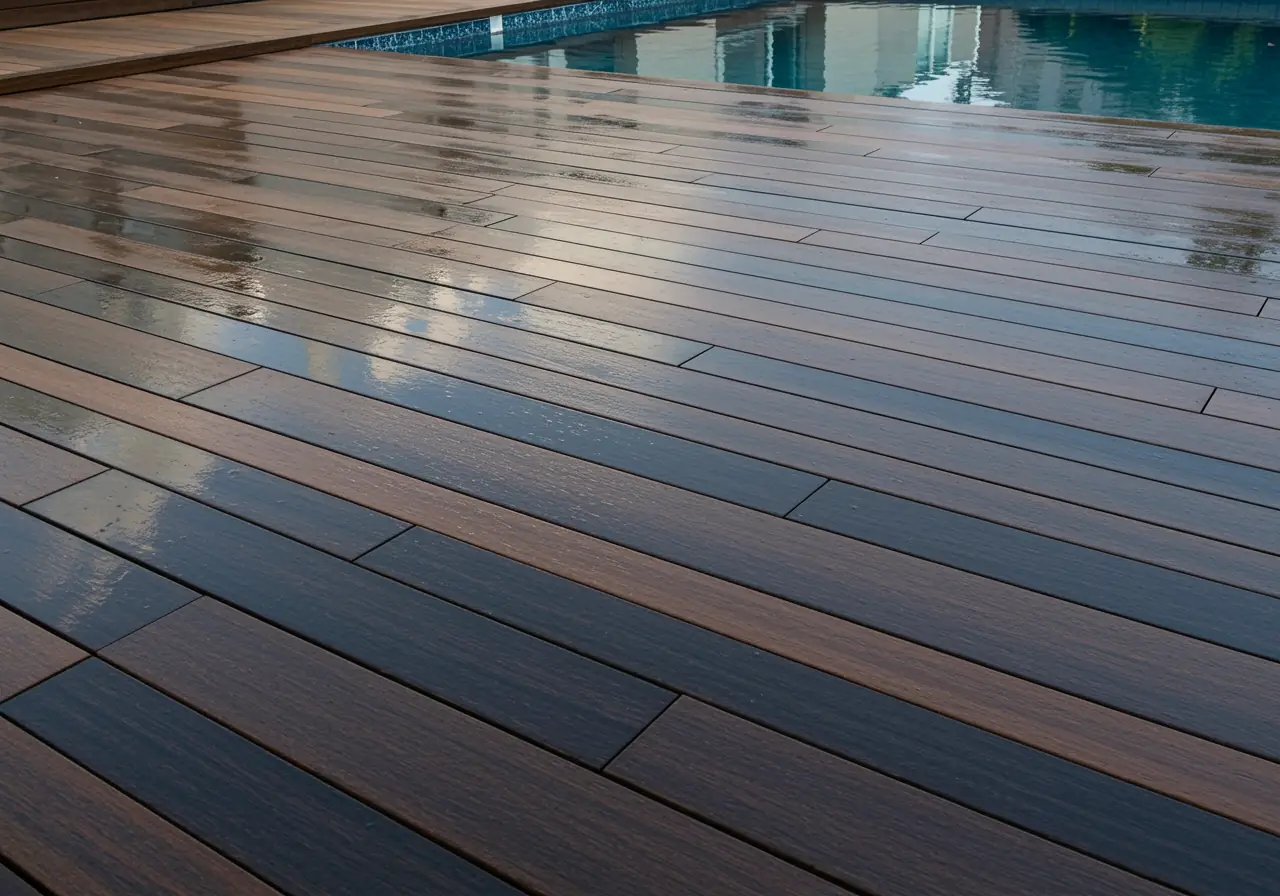
The performance gap becomes striking when comparing standard versus climate-matched finishes. Virginia's freeze-thaw cycles force moisture deeper into wood fibers, while UV radiation breaks down both wood lignin and finish resins simultaneously. These dual stresses create the perfect conditions for rapid deterioration, highlighting the need for finishes with UV absorbers and robust waterproofing capabilities.
Premium decking materials prove worthless without appropriate protection systems. The finish performance equation directly impacts your deck's lifespan - making climate-specific selection as critical as your initial material investment. Standard finishes requiring reapplication every 1-2 years versus high-quality climate-matched options extending to 3-4 years demonstrates why regional formulations matter for Virginia homeowners seeking lasting deck protection.
Protect your deck from Virginia’s harsh weather with My Modern Renovations. Get expert climate-specific staining and sealing - book your free estimate today.
Types of Deck Finishes and Their Pros & Cons
The performance gap between finish types becomes clear when examining how different formulations handle Virginia's climate extremes. Understanding these fundamental differences reveals why contractors often recommend certain products - and why those recommendations don't always serve your long-term interests.
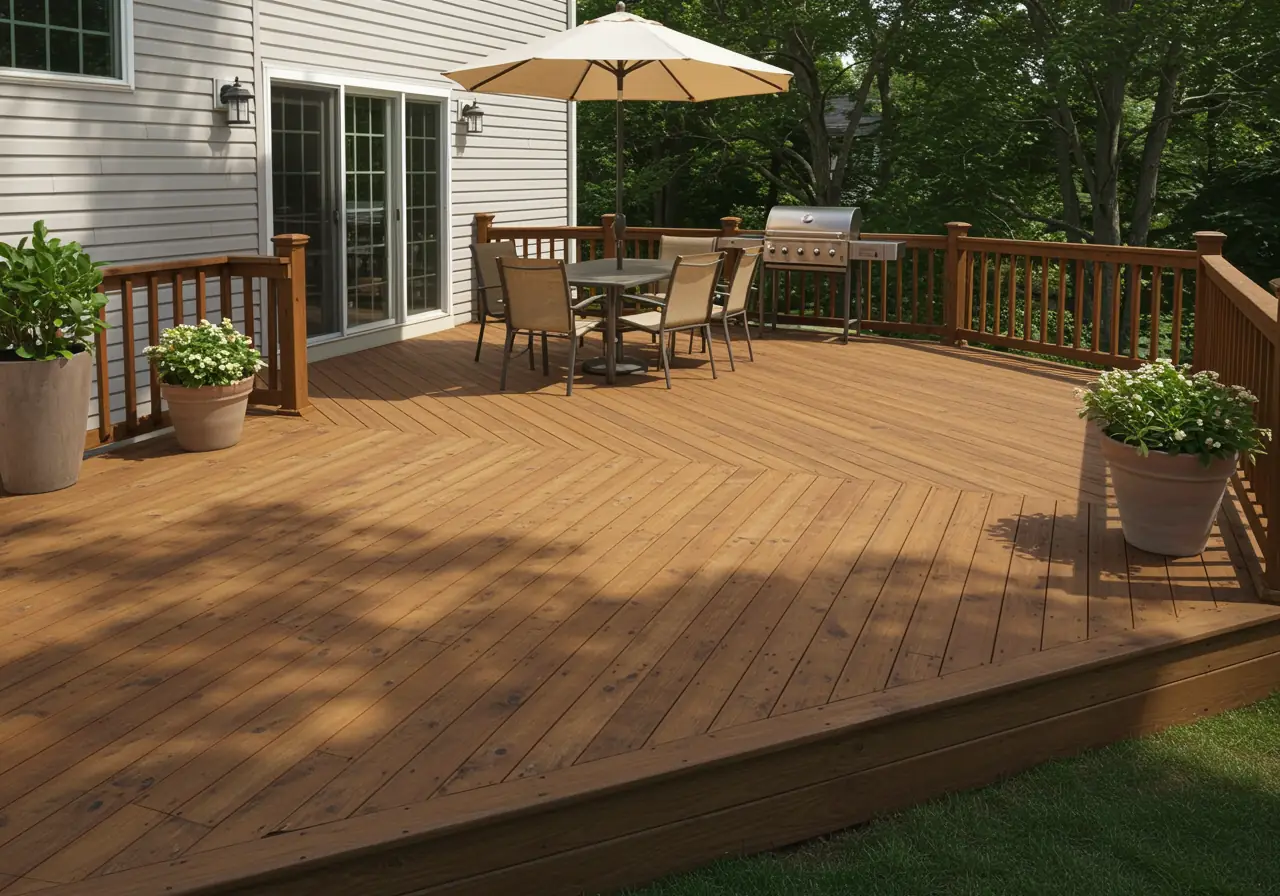
Oil-based vs. water-based finishes
Oil-based finishes demonstrate superior wood penetration, creating moisture barriers that outperform surface-coating alternatives in Virginia's humid conditions. These traditional formulations enhance natural wood grain while allowing recoating without extensive surface preparation. The trade-off involves extended 4-12 hours drying time, creating application challenges during Virginia's unpredictable weather windows.
Water-based alternatives have evolved significantly, now delivering excellent protection with faster 2-hour drying times. These formulations contain reduced volatile organic compounds (VOCs) and offer simple soap-and-water cleanup. Many include zinc additives specifically engineered to combat fungal growth - a critical advantage for Virginia's moisture-rich environment.
The verdict on oil versus water-based becomes clear when comparing penetration depth and longevity. Oil-based finishes penetrate deeper into wood fibers, providing superior moisture resistance. Water-based options excel at UV protection and color retention, essential for Virginia decks facing intense solar exposure.
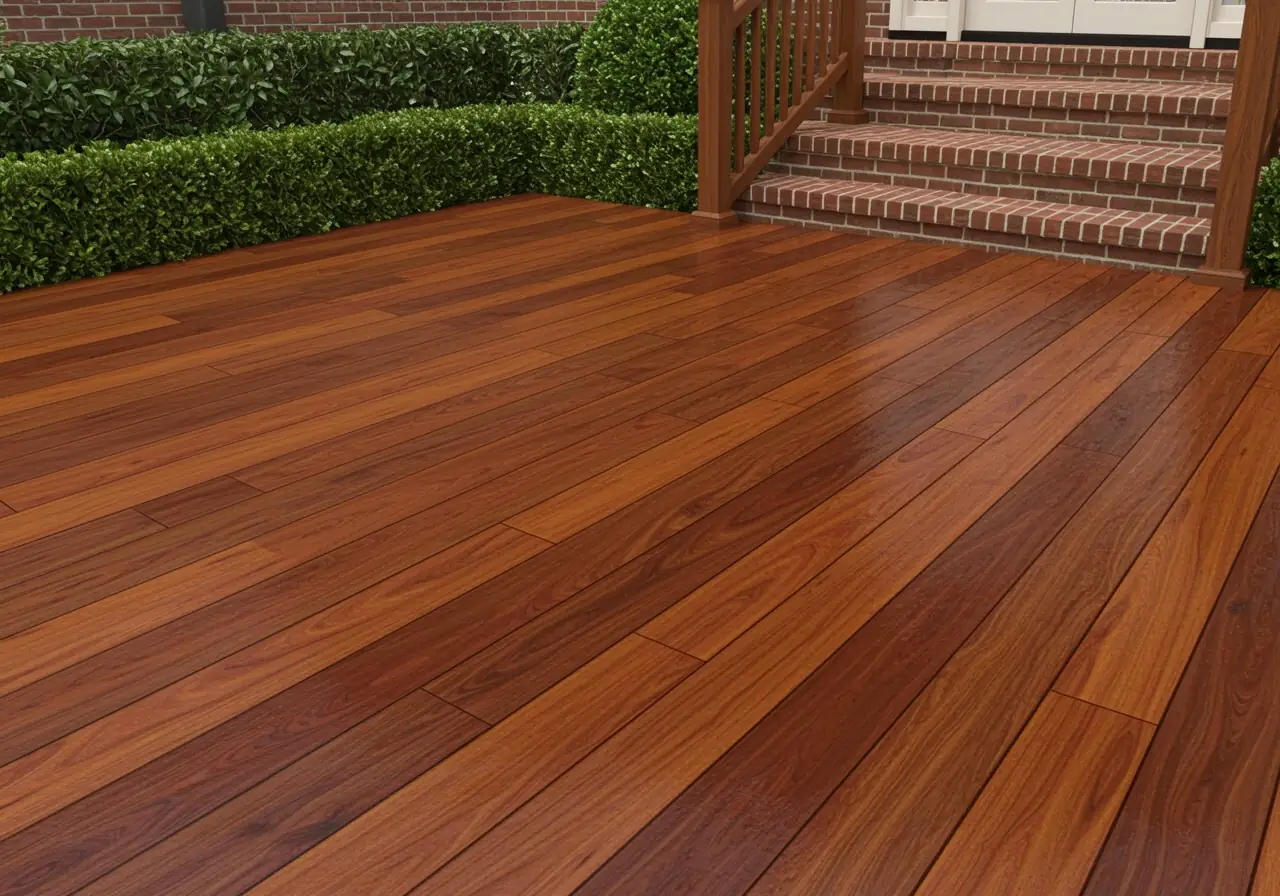
Transparent, semi-transparent, and solid stains
Clear waterproofing preserves wood's natural appearance but provides minimal UV defense, demanding frequent reapplication under Virginia's intense sunlight. Transparent formulations typically require yearly renewal to maintain protective effectiveness.
Semi-transparent stains achieve the optimal balance through subtle pigmentation that preserves wood grain visibility. The added pigment delivers essential UV protection without masking wood character. For Virginia installations, this option consistently proves most versatile across different exposure conditions.
Solid stains create opaque, paint-like coverage that conceals imperfections while offering maximum UV defense. Despite hiding natural wood grain, solid formulations resist weather damage effectively, typically requiring reapplication only every 3-5 years on horizontal deck surfaces.
Anti-slip and UV-resistant coatings
Virginia's alternating wet and sunny conditions demand specialized coating features for safety and durability. Anti-slip additives integrate into water-based formulations, creating textured surfaces that reduce fall risks during wet periods and around pool areas.
UV-resistant formulations containing specialized pigments and UV absorbers block harmful radiation that rapidly degrades unprotected wood in Virginia's high-sun environment. The maintenance cycle varies significantly by application: horizontal deck surfaces require reapplication every 1-3 years, while vertical elements like railings extend to 3-7 years between treatments.
These specialized formulations cost more initially but deliver superior safety performance and extended protection cycles compared to standard finishes - a crucial consideration for Virginia homeowners facing both safety concerns and demanding weather conditions.
Choose the right finish for Virginia’s tough climate with My Modern Renovations. From oil-based stains to UV-resistant coatings, our experts apply premium, long-lasting solutions that protect your deck from heat, humidity, and wear. Request your free consultation today.
Top 5 Deck Finishes That Last in Virginia
Performance data from Virginia's demanding climate conditions reveals which finishes consistently deliver superior protection when others fail after just one season.
1. Semi-transparent oil-based stain for UV and moisture
Testing reveals semi-transparent oil-based options like SuperDeck and Cabot create exceptional moisture barriers while maintaining natural wood character. These formulations penetrate deep into wood fibers rather than forming surface films, delivering superior protection against Virginia's humidity fluctuations. The scuff-resistant barrier actively inhibits mildew growth - a critical advantage for Virginia's wet seasons.
Application becomes critical within the 50-90°F temperature window for optimal penetration. The performance reality many contractors don't discuss: most options require yearly reapplication despite marketing claims, with customer reviews consistently reporting degradation after single winter cycles.
2. Solid color acrylic stain for older decks
Cabot's Solid Color Acrylic Stain creates flexible finishes that expand and contract with Virginia's temperature swings without chalking or peeling. This water-based formulation delivers exceptional washability alongside advanced UV protection. The versatility becomes particularly valuable for older Virginia decks with visible wear patterns or mismatched replacement boards.
The 4-6 hour drying window requires careful timing around Virginia's unpredictable weather patterns. However, this finish typically lasts 3-5 years even under challenging exposure conditions - a significant durability advantage over annual retreatment options.
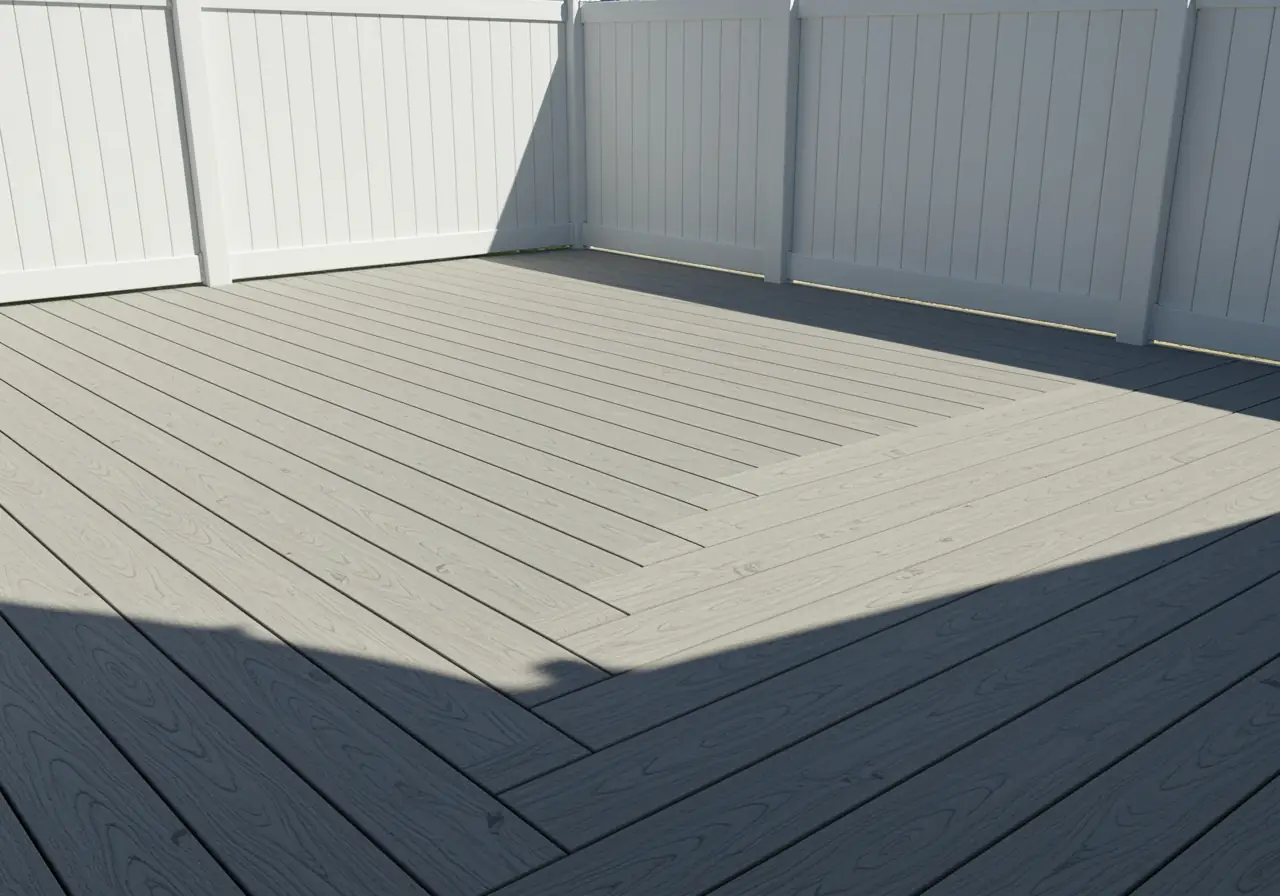
3. Penetrating oil finish for hardwood decks
Dense tropical species like Ipe and Mahogany demand specialized treatment where conventional stains fail completely. Penofin Hardwood Formula penetrates effectively through natural wood oils that reject standard finishes. The Brazilian Rosewood Oil content nourishes wood from within rather than creating surface barriers.
These penetrating oils allow natural wood movement while providing essential UV protection. The maintenance reality: initial applications require six-month refreshing, but subsequent treatments extend significantly longer between applications.
4. Water-based stain with anti-slip additives
Safety performance becomes critical during Virginia's wet periods. Deck-O-Grip W/B incorporates specialized additives that create slip-resistant surfaces without compromising finish quality. This non-yellowing water-based formula demonstrates superior resistance to rain, sun exposure, and chemical damage.
The application flexibility extends from -10°F to 110°F - accommodating Virginia's seasonal temperature variations. Anti-slip additives like Surface Grip can be incorporated into existing sealers at approximately 2/3 cup per gallon ratios for enhanced safety performance.
5. Hybrid deck sealers for full sun and snow exposure
Olympic ELITE Advanced Stain combines oil and water-based advantages into single formulations. These hybrids expand and contract with temperature changes, preventing the peeling failures common during Virginia's freeze-thaw cycles. The lifetime protection against mold, mildew, and algae growth addresses Virginia's humid environment challenges directly.
Expert Stain & Seal provides another hybrid approach featuring deep penetration through non-drying oils that continuously nourish wood from interior fibers outward. The performance gap between hybrid systems and traditional options becomes clear during Virginia's most demanding weather periods.
Get the best results with My Modern Renovations - Virginia’s trusted experts in deck protection. We apply top-performing finishes like oil-based, acrylic, and hybrid sealers built to withstand humidity, UV rays, and freeze-thaw cycles. Book your free deck evaluation today and protect your investment for years to come.
Material-Specific Finish Selection: The Performance Reality
Different deck materials expose distinct vulnerabilities when Virginia contractors apply one-size-fits-all finishing approaches. Understanding these material-specific requirements prevents costly mistakes and premature failure.
Pressure-Treated Wood: Timing and Penetration Challenges
Pressure-treated lumber creates notorious staining difficulties that many contractors underestimate. Fresh pressure-treated installations require complete moisture evacuation - typically several weeks - before accepting any finish properly. The "sprinkle test" reveals readiness when water absorbs within 10 minutes of application.
Recommended approaches: Clear or semi-transparent oil-based sealants showcase natural wood characteristics while providing moisture barriers. Solid stains mask pressure-treated lumber's greenish tint effectively for homeowners preferring uniform appearance. Virginia's demanding conditions favor Flood's Spa N Deck or Wood RX 100% acrylic formulations for maximum durability.
Composite and PVC Decking: The Warranty Trap
Modern composite materials featuring polymer caps should never receive paint or stain application. Older, uncapped composite installations accept finishing products safely, though manufacturer approval remains essential. Applying finishes to capped composite typically voids manufacturer warranties - an expensive oversight many contractors fail to mention.
Composite and PVC materials require minimal maintenance beyond periodic cleaning. These engineered products resist fading, staining, scratching, and mold growth without additional protective coatings.
Exotic Hardwoods: Specialized Oil Requirements
Dense tropical species like Ipe demand completely different treatment protocols. Standard deck finishes fail on these naturally oily, dense materials. UV oil formulations replace traditional stains for optimal penetration and protection.
Premium choices: Messmer's Ipe Hardwood Deck Oil offers Natural or Mahogany tone options, while Penofin's Marine Oil provides high trans-oxide pigment content for UV protection. These specialized formulations penetrate effectively while preserving natural wood characteristics.
Annual maintenance cycles - cleaning, light sanding, and oil reapplication - maintain hardwood beauty. Surface preparation becomes critical since hardwoods must achieve complete structural soundness and moisture removal before treatment.
Location-Specific Performance Considerations
Full-sun exposure creates surface tempera tures reaching 140°F, making material and finish selection critical for safety and longevity. Light-colored capped composite delivers optimal performance under intense solar conditions.
High-traffic zones like stairs and walkways demand finishes with exceptional durability ratings. Coastal Virginia properties require mildewcide-enhanced products to combat salt exposure and elevated humidity levels.
The application window between 50°F and 90°F makes spring and fall optimal seasons for finish application across Virginia's varied climate zones. This environmental consideration is crucial for ensuring proper adhesion and curing of the deck sealer or waterproof coating.
Different materials need different protection - don’t risk costly mistakes. My Modern Renovations applies the right stains and sealers for your deck type, from pressure-treated wood to exotic hardwoods and composites. Our experts ensure perfect timing, adhesion, and durability tailored to Virginia’s climate. Schedule your free deck inspection today.
Conclusion
Choosing the right deck finish for Virginia’s climate determines whether your deck lasts decades or demands costly repairs after only a few seasons. With the state’s freeze-thaw cycles, high UV exposure, and humidity often above 70%, Virginia decks require climate-specific stains and sealers engineered for these extremes.
Semi-transparent oil-based stains provide the best protection, deeply penetrating wood to resist moisture while preserving its natural beauty.
Water-based finishes offer faster drying times and strong UV defense, ideal for unpredictable Virginia weather, while anti-slip coatings improve safety during wet conditions. Matching your finish to your material - oil-based sealants for pressure-treated wood, penetrating oils for Ipe or hardwoods, and no finish for composite decking - ensures long-term performance. Apply between 50°F and 90°F in spring or fall for optimal results and plan maintenance every 1–3 years to prevent failure. Investing in durable, Virginia-tested deck finishes safeguards your outdoor living space and maximizes its lifespan and value.
Protect your deck the right way with My Modern Renovations. Our Virginia-based team applies climate-specific stains and sealers engineered for humidity, UV exposure, and freeze-thaw cycles - ensuring beauty and durability for decades. From pressure-treated wood to exotic hardwoods, we match every finish to your material for lasting protection. Book your free deck consultation today.
Key Takeaways
Virginia's extreme weather conditions - from humid 90°F summers to freezing winters - demand climate-specific deck finishes that can handle temperature fluctuations and high UV exposure.
• Semi-transparent oil-based stains offer the best balance for Virginia decks, providing deep moisture protection while preserving natural wood grain visibility.
• Apply finishes between 50-90°F during spring or fall to ensure optimal adhesion and curing before Virginia's harsh summer or winter conditions.
• Match your finish to your deck material: pressure-treated wood needs oil-based sealants, hardwoods require specialized penetrating oils, and composite decking needs no finish at all.
• Plan for regular maintenance cycles: horizontal deck surfaces need reapplication every 1-3 years, while railings can last 3-7 years between treatments.
• Choose finishes with UV protection and anti-slip additives for Virginia's 2,600+ annual sunshine hours and frequent wet conditions to maximize safety and longevity.
The right finish selection based on your specific location, deck material, and Virginia's climate challenges can extend your deck's life significantly while reducing long-term maintenance costs and preserving your outdoor living investment.
FAQs
Q1. How often should I reapply deck finish in Virginia's climate? For horizontal surfaces, reapplication is typically needed every 1-3 years, while vertical elements like railings can last 3-7 years between treatments. The frequency depends on the type of finish used and exposure to sun and weather.
Q2. What's the best deck finish for pressure-treated wood in Virginia? Clear or semi-transparent oil-based sealants are excellent for pressure-treated wood, showcasing the natural wood color while providing protection. For Virginia's climate, 100% acrylic finishes like Flood's Spa N Deck or Wood RX offer great durability.
Q3. Can I apply deck finish year-round in Virginia? The ideal temperature range for applying deck finishes is between 50-90°F, making spring and fall the best seasons for application in Virginia. Avoid applying finishes during extreme temperatures or high humidity.
Q4. What type of finish is best for decks in full sun exposure in Virginia? For decks in full sun, choose finishes with high UV protection. Semi-transparent oil-based stains or solid color acrylic stains with UV-resistant formulations are excellent choices. Light-colored capped composite decking also performs well in full-sun locations.
Q5. How should I protect my deck in coastal areas of Virginia? In coastal areas, use finishes with added mildewcides to combat higher humidity and salt exposure. Hybrid deck sealers that offer protection against mold, mildew, and algae growth are particularly effective for Virginia's coastal climate.

4 steps to get your house safe
Book your Consultation
Removal & Preparation
Professional Installation
Post-Care & Warranty
Licensed & Insured
Turn Key Solution
Low Interest Financing







